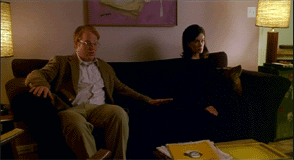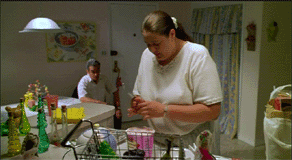|
Newest Reviews:
New Movies -
The Tunnel
V/H/S
The Tall Man
Mama Africa
Detention
Brake
Ted
Tomboy
Brownian Movement
Last Ride
[Rec]³: Genesis
Hara-Kiri: Death of a Samurai
Indie Game: The Movie
Abraham Lincoln: Vampire Hunter
Old Movies -
Touki Bouki: The Journey of the Hyena
Drums Along the Mohawk
The Chase
The Heiress
Show
People
The Strange Affair of Uncle Harry
Pitfall
Driftwood
Miracle Mile
The Great Flamarion
Dark Habits
Archives -
Recap: 2000,
2001, 2002,
2003, 2004
, 2005, 2006,
2007 , 2008
, 2009 ,
2010 , 2011 ,
2012
All reviews alphabetically
All reviews by star rating
All reviews by release year
Masterpieces
Screening Log
Links
FAQ
E-mail me
HOME
| |
Happiness (Todd Solondz) 1998
 To follow up his brilliantly nihilistic middle-school comedy debut Welcome
to the Dollhouse, Todd Solondz made an even more pessimistic tale, this time
focusing on sexual frustration. In the ironically titled Happiness,
Solondz pumps up the humiliation level on his cast well beyond what he had done
with Dollhouse, and somehow manages to avoid some of that film's sadism.
Interestingly though, he still has no respite for Dollhouse's Dawn Weiner
- this film reveals her whole family was killed by a serial killer. There's more
compassion here for the characters than there was for Dawn. Perhaps its because
the whole world seems downtrodden here. Dollhouse's high school was a
somewhat functional world with Dawn a dysfunction in it. In Happiness, a
scene in which Phillip Seymour Hoffman literally reaches into the black void
that is Lara Flynn Boyle is particularly telling. In this film's universe,
everyone is fucked up, so there is no solace to be found in others. The film's
cast tries though, and for that, we empathize with them.
To follow up his brilliantly nihilistic middle-school comedy debut Welcome
to the Dollhouse, Todd Solondz made an even more pessimistic tale, this time
focusing on sexual frustration. In the ironically titled Happiness,
Solondz pumps up the humiliation level on his cast well beyond what he had done
with Dollhouse, and somehow manages to avoid some of that film's sadism.
Interestingly though, he still has no respite for Dollhouse's Dawn Weiner
- this film reveals her whole family was killed by a serial killer. There's more
compassion here for the characters than there was for Dawn. Perhaps its because
the whole world seems downtrodden here. Dollhouse's high school was a
somewhat functional world with Dawn a dysfunction in it. In Happiness, a
scene in which Phillip Seymour Hoffman literally reaches into the black void
that is Lara Flynn Boyle is particularly telling. In this film's universe,
everyone is fucked up, so there is no solace to be found in others. The film's
cast tries though, and for that, we empathize with them.

 

That they provoke empathy at all is almost amazing though. The characters
display an enormous number of perversions (voyeurism, pedophilia, obscene-phone
calling, murder) and sometimes we feel that the only reason that they do is so
Solondz can shock us. The interesting thing here is that the amount of sympathy
from the viewer seems to be directly proportionate to the amount of perversion
on display. We can sympathize with the pedophile: he takes time out to explain
to his son his impulses (though he alarmingly offers to demonstrate), and the
scene where we wait in suspense for his young victim to eat a sleeping pill is
directorial manipulation on the level of Psycho. The film's more normal
characters are ghastly though (a passive-aggressive, happy only because she can
remain blind to those around her, housewife leads that race). It's a funny film
despite all this, and is never nearly as disturbing or solemn as such subject
matter might suggest. Solondz manages to work the audience over, but at least,
for once, it's not to make us feel falsely better about ourselves.
****
September, 2001
Jeremy Heilman
|